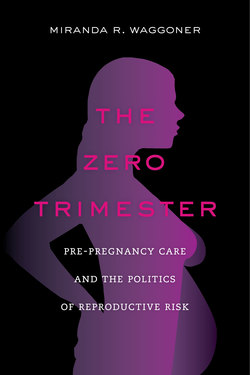The Zero Trimester

Реклама. ООО «ЛитРес», ИНН: 7719571260.
Оглавление
Miranda R. Waggoner. The Zero Trimester
Отрывок из книги
The Zero Trimester
PRE-PREGNANCY CARE AND THE
.....
Next, and more generally, we know very little about what actually causes most birth defects.65 Studies point to a profound lack of etiological understanding of what makes a healthy—or unhealthy—pregnancy and birth, and medical experts often do not understand the root cause of most poor birth outcomes.66 In fact, the two major causes of infant mortality—congenital anomalies and preterm birth—are not well understood by the medical community.67 Moreover, in contrast to media-perpetrated stereotypes, most neonatal deaths occur among women in their twenties and early thirties who do seek medical care and who do not use illicit drugs.68 In other words, the majority of adverse birth outcomes are to seemingly healthy women. Some measure of responsibility might lie with institutionalized medical practices, and not women’s behavior. For example, analyses of the increase in preterm births find that high rates of labor induction, cesarean deliveries, and assisted reproductive technologies might be key drivers—factors that are not necessarily related to the pre-pregnancy health status of women but rather to the institutionalized culture of medical intervention in reproduction.69
Third, there are discrepancies in understandings about the health status of women of reproductive age. In recent population-based research, almost 89% of women of reproductive age reported good, very good, or excellent health, and about 75% of women of reproductive age had health coverage during the month before their most recent pregnancy.70 At the same time, a quarter of women of reproductive age reported smoking cigarettes in the three months prior to pregnancy; about half reported drinking alcohol. Only about 30% reported taking a multivitamin or folic acid supplement.71 These numbers lead experts to note that there is room for improvement in expanding knowledge about what constitutes good pre-pregnancy health. Even so, it is worth noting that we also do not know much about how pre-pregnancy health status has changed among women of reproductive age over the years; before the CDC’s recommendations for improving pre-pregnancy care were published, few states monitored pre-conception health indicators specifically.72 Data do exist, however, on general health behaviors and health risks of non-pregnant women over time. Such data suggest that some behaviors have improved since the CDC’s recommendations, such as substantial reductions in smoking and drinking. Conversely, reports of binge drinking, obesity, or having diabetes, as well as self-reported health, all significantly worsened over the same time frame.73
.....